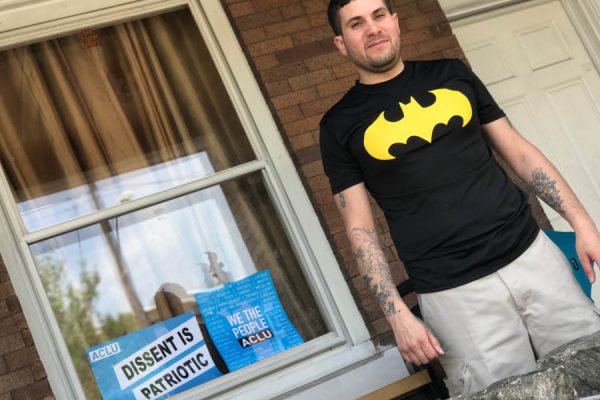New Legislation to Fight Urban Blight in the Riverwards
As you walk down the street on your way to work, home, or perhaps a restaurant for a night out, chances are you’ll pass by at least one abandoned property. Unless you’re a newcomer to the Riverwards, you’re not going to pause to examine the broken windows and graffiti-plastered plywood. Chances are you won’t even take notice of the property. With vacant properties and abandoned buildings scattered throughout Riverward communities, why would you pay attention to such a commonplace sight?
Yet common as they are, no one can deny that abandoned buildings are a problem in our neighborhood. These buildings fall into disrepair and lower the desirability of the properties around them, and if this pattern—known as “urban blight”—goes too far, it can end up virtually destroying a once-thriving neighborhood. Empty buildings can also provide places for crimes to take place undetected. Though the boarded-up windows and graffiti may conceal a beautiful structure, and the property may be in an ideal location, there hasn’t been any way to combat this problem and turn the properties into something useful.
That is, until now.
Legislation to fight urban blight, by forming public land bank authorities that can reclaim and develop tax-foreclosed abandoned properties, has at last been enacted in Pennsylvania, known as Act 153 of 2012. State Representative John Taylor, who sponsored this legislation, joined Governor Tom Corbett at a ceremonial signing of the bill on Thursday, January 17. They met at Impact Services Corporation on Allegheny Avenue, right in the heart of a blight-afflicted Riverwards neighborhood. The enthusiastic supporters that turned out for the signing were representative of the entire neighborhood’s excitement for the changes this bill can bring to our community.
Tamar Shapiro, president of the Center for Community Progress, an organization that works to improve neighborhoods by reusing vacant properties, said, “The reason that the Center for Community Progress is particularly excited about this event today is that we’ve been working in Pennsylvania on these issues for two years now.” The organization, she said, “provided advice and expertise on the importance of land banking as well as the best practices around land banking to legislative leaders,” such as Representative Taylor. “The legislation that we’re going to celebrate today provides a very effective tool for communities across the state—urban, suburban, rural, of all sizes—to effectively address the challenges of vacancy and abandonment.”
Representative Taylor, who played a crucial part in making this legislation happen, jokingly said, “What we’re doing here today is much more important than what’s going on with the Philadelphia Eagles,” a sentiment that the roomful of supporters concurred with. “We’re here at Impact Services for a very important reason,” he went on. “This particular bill gives us a tool to access property and dispose of it in a way that makes sense to the community. A lot of people ask me for particular examples, and I can take you only about a quarter-mile away, to the 1300 block of Agate Street, where you’re going to find 17 abandoned houses on one block.” He noted that with blight as bad as this, getting one person to claim one house wouldn’t make much of a difference. This is where the importance of the land bank, which can acquire multiple properties and distribute them to developers, comes in. “If we can do that block, we change the entire neighborhood. We change this particular neighborhood, we change the city of Philadelphia.”
Governor Corbett, whom Taylor thanked profusely for his understanding and assistance in making this land bank legislation happen, said, “Representative Taylor told me almost 40,000 pieces of property here in the city of Philadelphia are abandoned. Taxes are one thing, but abandoned properties can be used in illegal ways or just abused by people—taking away from the community, taking away from the people who live there.” He noted that though the problem was so severe and the logic of land banks so clear, it took years of hard work from a lot of people to make it happen in the Pennsylvania State Capitol in Harrisburg, where problems centered in large cities aren’t always prioritized. “Common sense, which is absolutely necessary to run our cities and our municipalities, and really our state and country, is something that is reflected in this bill.”
The signing of the bill at Impact Services, noted Governor Corbett, was a “ceremonial signing, because we did sign it back in October of last year. We thought it was appropriate to come down to an area that will see the result of this very, very quickly.” The bill was then signed, while community supporters snapped pictures and applauded.
The enthusiasm of the politicians, supporting organizations, and community members made it clear just how important this bill is going to be for our neighborhood, as well as the entire city of Philadelphia. Even some students from Memphis Street Academy, located just a few blocks away from the ceremony at Impact Services, were in attendance, as schools are no small part of the areas affected by urban blight.
After the signing, attendees stayed around to chat about the changes that this bill will make possible. Posted around the room were pictures of just a few of the many local abandoned buildings. The images of the decrepit structures were familiar, on streets that were recognizable to anyone from the neighborhood: Kensington Avenue, Allegheny Avenue, and Agate Street. Reclaiming these buildings, so near to the places we live, work, eat, and shop, will make a tangible difference to all residents of the Riverwards.
Calling it something to be excited about is an understatement—it’s something to be ecstatic about.





